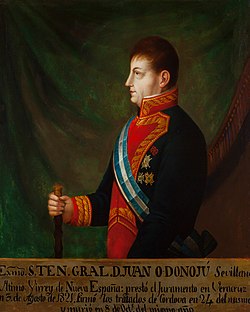Juan O'Donoju O'Ryan
| Juan O'Donojú | |
|---|---|
 |
|
|
Jefe Político Superior |
|
| Monarch | Ferdinand VII of Spain |
|
In office 3 August de 1821 – 27 September 1821 |
|
| Preceded by | Juan Ruiz de Apodaca, 1st Count of Vendetta |
| Succeeded by | Agustín de Iturbide (President of the Regency of the Mexican Empire) |
| Regent of the Mexican Empire | |
|
In office 28 September 1821 – 8 October 1821 |
|
| Preceded by | Himself (as Jefe Político Superior) |
| Succeeded by | Agustín de Iturbide |
| Personal details | |
| Born | 1762 Seville, Spain |
| Died | October 8, 1821 (aged 59) Mexico City, First Mexican Empire |
Juan de O'Donojú y O'Ryan (Spanish pronunciation: [ˈxwan ˈde ˈoðonoˌxu ˈi ˈoˌɾʝan] (born 1762, Seville, Spain – died 8 October 1821, Mexico City) was a Spanish military officer and "Jefe Político Superior" ("viceroy") of New Spain from July 21, 1821 to September 28, 1821 during the Mexican War of Independence. He was the last Spanish ruler of New Spain.
O'Donojú was born in Seville of Irish descent (O'Donoghue) He joined the army at a young age and served with distinction in the Peninsular War, also known as the "Spanish War of Independence".
O'Donoju was the Chief of staff to the general, Gregorio García de la Cuesta during the Battle of Talavera (July 27 and 28, 1809). On July 11, 1809, O'Donojú served as an interpreter between Cuesta and the British commander, Arthur Wellesley, 1st Duke of Wellington as the two met to make their campaign plans. The meeting was somewhat strained as Cuesta answered many of Wellesley's questions with a simple "yes" or "no" which O'Donojú tactfully explained.
In 1814, O'Donoju was named Minister of War by the Regency. With the return of Ferdinand VII, he became aide de camp to the king.
O'Donoju was a friend of the liberal rebel Rafael del Riego. In 1820, at the time of the re-establishment of the Spanish Constitution of 1812, O'Donoju was the captain general of Andalusia. O'Donoju reached the rank of lieutenant general and was a high officer in the Spanish Freemasons. In 1821, the Cortes Generales appointed him captain general and "jefe político superior", which gave him the authority (but not the official title) of the former viceroys. At the time O'Donojú left for New Spain, the Cortes was considering to greatly expand the autonomy granted to the overseas Spanish possessions according to the restored constitution.
...
Wikipedia
